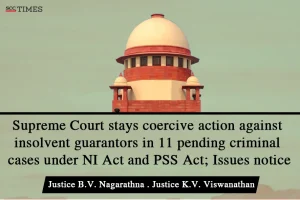Supreme Court: In a writ petition filed by directors and personal guarantors of GC Raj Fabrics Pvt. Ltd., challenging the criminal complaints across India for cheque dishonour and payment defaults related to loans guaranteed by them, the division bench of B.V. Nagarathna and K.V. Viswanathan, JJ. issued notice and directed that no coercive steps be taken against the petitioners in all 11 pending criminal cases across three States and four cities. These include five criminal trials in Punjab (including Chandigarh and Ludhiana), five in West Bengal (Kolkata), and one in Rajasthan (Jaipur). The proceedings consist of six cases under Section 138 of the Negotiable Instruments Act, 1881 (NI Act), and five cases under Section 25 of the Payment and Settlement Systems Act, 2007 (PSS Act).
The petitioners were directors and personal guarantors of GC Raj Fabrics Pvt. Ltd., a company facing severe financial distress. Both had invoked personal insolvency proceedings under Section 94 of the Insolvency and Bankruptcy Code, 2016, before the NCLT Chandigarh. Despite opting for the statutory resolution mechanism, creditors had initiated criminal complaints across India for cheque dishonour and payment defaults related to loans guaranteed by the petitioners.
The 11 pending matters arose from transactions connected to both the company’s and personal borrowings, in which the petitioners had been named as accused. They contended that there had been no willful default or fraudulent intent and that proceeding with these prosecutions during the insolvency process jeopardized their fundamental rights under Articles 14, 21, and 39-A of the Constitution.
The petitioners argued that the sheer volume of prosecutions not only sought to prosecute but effectively persecuted an insolvent individual, as no meaningful defense could be mounted in multiple cases scattered across the country. It was further submitted that under the IBC, the petitioners had a statutory right to present a repayment plan to creditors. The continuation of these proceedings, they argued, circumvented this opportunity, rendering the insolvency resolution process illusory.
They contended that the ongoing prosecutions had transformed the IBC process from a rehabilitative framework into a tool of harassment, depriving the petitioners of the chance to submit a repayment plan, which was the very safeguard the IBC was designed to provide.
[Raj Kumar Aggarwal v. Kotak Mahindra Bank, 2025 SCC OnLine SC 1721, decided on 11-08-2025]
Advocates who appeared in this case:
For Petitioner(s) :Mr. Akaant Kr. Mittal, Adv., Ms. Arveen Sekhon, Adv., Mrs. Bhavana Garg, Adv., Mr. Nikhil Jain, AOR, Ms. Divya Jain, Adv.

